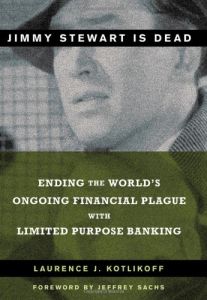Join getAbstract to access the summary!

Join getAbstract to access the summary!
Laurence J. Kotlikoff
Jimmy Stewart is Dead
Ending the World's Ongoing Financial Plague with Limited Purpose Banking
Wiley, 2010
What's inside?
Jimmy Stewart played a banker who had a wonderful life, but that’s just Hollywood. Find out how “limited purpose banking” can lead to a genuine, happy financial ending.
Recommendation
There’s no use pining for the good old days – It’s a Wonderful Life was just a Hollywood movie, the town of Bedford Falls doesn’t really exist and Jimmy Stewart is long gone. But earth-shattering economic tumult has a way of evoking nostalgia for the return of (what you think were) simpler, more honest fiscal times. Economist Laurence J. Kotlikoff delivers a salty, sometimes irreverent, but ultimately convincing remedy to cure you of the erroneous belief that banking should return to the past to make up for the sins of the present. He competently lays out his concept of how “limited purpose banking” would work while hoisting on their own petard the crafty bankers, sinister lenders and obfuscating bureaucrats who nearly crashed the economy. getAbstract recommends Kotlikoff’s original interpretation of events resulting from the 2008 crisis and his exposition of the far-reaching solution he offers, but quibbles over just one point: George Bailey ran the Bailey Building and Loan, not the Bailey Savings and Loan.
Summary
About the Author
Laurence J. Kotlikoff is an economics professor at Boston University and has worked with the World Bank and the IMF.


















Comment on this summary